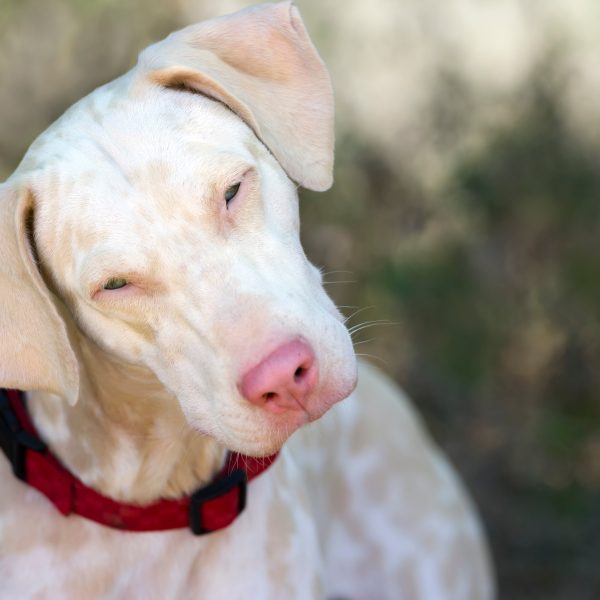What to Know About Albinism in Dogs

Have you ever seen a pure white dog and wondered if they’re just a white dog or if are they an albino? People have often wondered if albinism can occur in dogs and the answer is yes. Here’s what to know about albinism in dogs:
What is Albinism in Dogs?
Albinism in dogs is a lack of pigmentation in the skin, eyes, and fur. Since there is no pigmentation in the skin, blood vessels can be seen, giving a pink tinge to the skin. Albino dogs have very light-colored blue or almost white eyes and pink noses.
The easiest way to distinguish an albino dog from a dog with all-white fur is that the eyes of an albino dog have a pinkish tinge in the whites of the eyes. All white-coated dogs will still have colored eyes.
What Causes Albinism in Dogs?
For a dog to be considered a true albino, they must lack the genes that cause melanin. Tyrosinase is an enzyme that causes melanin production and the lack of this enzyme is called tyrosinase-negative. Albino dogs that lack this enzyme are produced when both parents have this recessive gene.
True albinism in dogs is pretty rare. Because albino dogs have more health problems beyond common health problems in dogs, most breeders try to avoid breeding albino dogs. However, dogs with other forms of albinism are a bit more common.
Other Forms of Albinism
Other forms of albinism, called tyrosinase-positive, produce dogs with white coats that do have melanin, or pigment. Some of the breeds that are considered to be tyrosinase-positive are West Highland White Terriers, white German Shepherds, and white Doberman Pinschers. They may appear to be white, but their coats are actually a very light gray or cream.
There are a few coat patterns that produce coats that look very similar to albinism. These patterns are called merle and piebald and are very light-colored. These coats can look like albinism but they are not true albinism. These patterns are more common in breeds like Great Danes and Australian Shepherds.
Is Albinism Hereditary in Dogs?
Albinism is passed down through families. Certain dogs lack the gene that causes melanin and this gets passed down to the offspring. If a dog’s parents both lack this gene, the likelihood of albinism is much higher.
Albino Dogs and Health Problems
Albino dogs usually have more health problems due to the lack of pigmentation in their skin, fur, and eyes. However, not every dog with albinism will develop these issues. Due to the genetic nature of albinism, dogs with albinism may be prone to other genetic disorders as well.
It’s important for your dog to have regular checkups to monitor their skin and eyes. Regular checkups are important for any dog and are one of the ways to be a responsible dog owner.
Eye Problems
Heterochromia in dogs, or having two different-colored eyes, can sometimes be caused by albinism, but heterochromia alone usually doesn’t cause issues unless it is caused by injury, disease, medication, or paired with other factors. However, dogs with albinism will often have eye problems. Due to a lack of colored iris in the eye, albino dogs often have poor vision or may even be blind.
They are also incredibly sensitive to light. Try to limit their time out in bright sun or offer eye protection if they’re in a sunny or brightly lit area. There are sunglasses for dogs available! This product to protect your dog from weather and sun will make your dog look pretty cool in their shades!
Skin Problems
There are a few common skin problems in dogs that albino dogs will deal with. Because of little or no melanin in their skin, albino dogs are much more prone to sun damage, which can lead to skin cancer.
It’s important to protect dogs from the sun, but albino dogs need extra protection. There are sunscreens for dogs to try or you can stick to shady areas. You can also get protective clothing or coats to protect their skin from sun exposure. Protecting any dog from sun damage is a beach safety tip for dogs to keep in mind anytime your dog is outside.
This is just an overview of what to know about albinism in dogs. Albino dogs can lead full and happy lives, especially with the right care. If you have any questions, don’t be afraid to talk to your vet!
